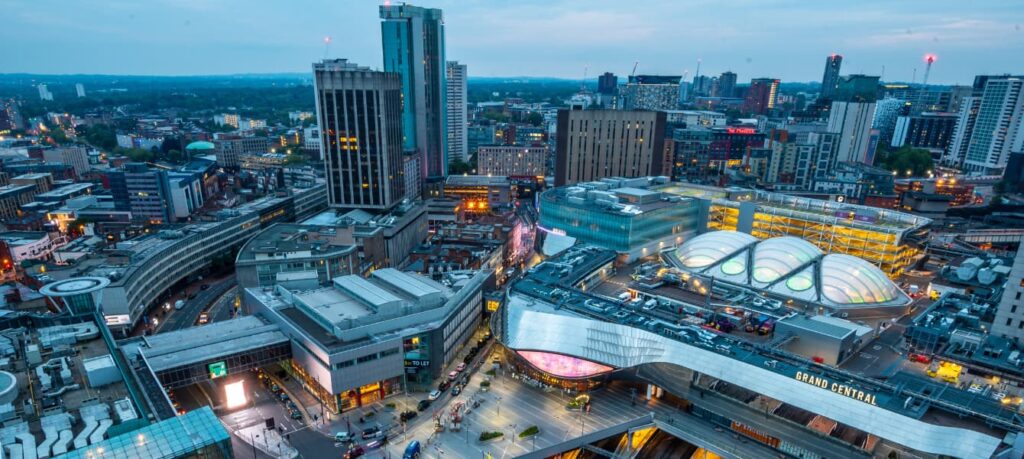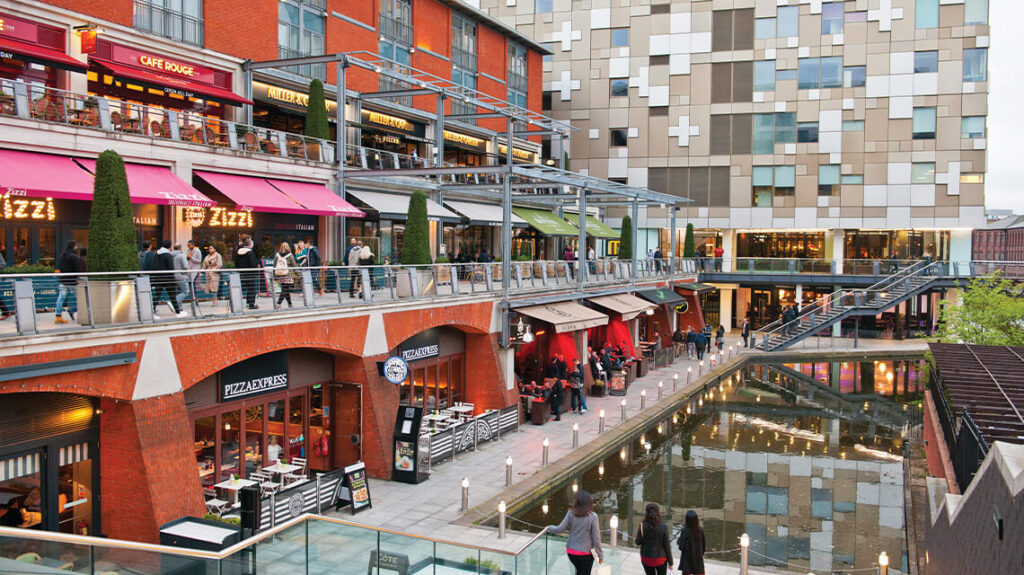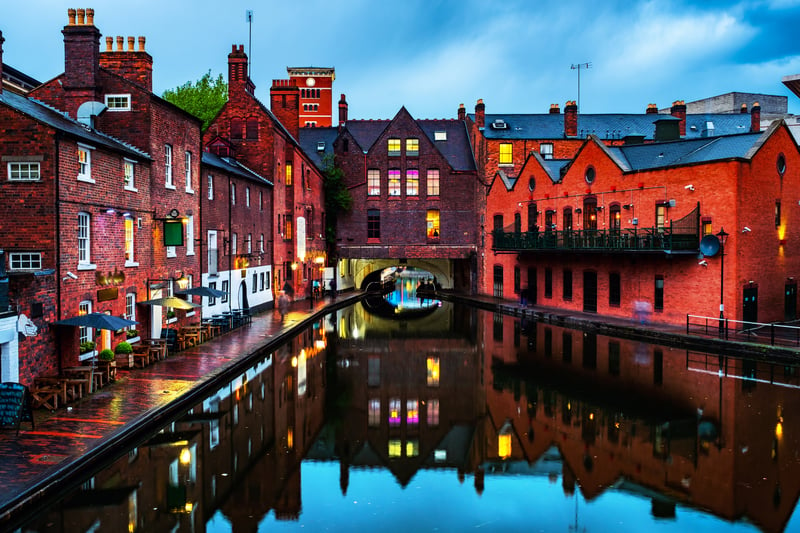No, Birmingham is not in London. Birmingham is a major city in the West Midlands region of England, while London is the capital city of England and the United Kingdom, located in the southeastern part of the country. Birmingham and London are separate cities, with Birmingham being approximately 120 miles northwest of London.
What is Birmingham’s significance and location?

Birmingham is located in the West Midlands region of England. Geographically, it sits in the heart of the country, making it a strategic hub for transportation and commerce. The city is situated approximately 120 miles northwest of London and is well-connected by road, rail, and air networks. Its central location has historically contributed to its growth as an industrial and commercial center.
Birmingham holds significant importance both historically and economically. It is often referred to as the “Second City of the United Kingdom” due to its large population and economic influence, second only to London. Birmingham is renowned for its diverse economy, which encompasses manufacturing, financial services, education, healthcare, and tourism. The city is home to many leading companies and institutions, contributing significantly to the national economy. Additionally, Birmingham is culturally diverse, with a rich heritage that includes contributions to literature, music, and the arts.
Birmingham has a rich and varied history that spans over centuries. It rose to prominence during the Industrial Revolution, becoming a leading center for manufacturing and innovation. The city played a crucial role in the development of industries such as metalworking, textiles, and engineering, earning it the nickname “The Workshop of the World.” Throughout its history, Birmingham has experienced periods of growth, decline, and renewal, reflecting broader economic and social trends in the UK. Today, it stands as a vibrant and dynamic metropolis, continuing to evolve and adapt to the challenges of the modern world.
How significant is London and where is it located?

London is the capital city of England and the United Kingdom, located in the southeastern part of the country. It is situated on the River Thames, which runs through the heart of the city, dividing it into North and South London. Geographically, London covers an area of approximately 1,572 square kilometers (607 square miles) and is bordered by the counties of Essex, Hertfordshire, and Surrey. The city’s strategic location on the Thames estuary has historically facilitated trade and commerce, contributing to its growth as a global financial and cultural center.
London holds immense significance on both a national and international scale. As the capital city of the UK, it serves as the political, economic, and cultural hub of the country. London is home to numerous government institutions, including the Houses of Parliament at Westminster, Buckingham Palace (the official residence of the British monarch), and the headquarters of many national and international corporations. Economically, London is one of the world’s leading financial centers, hosting the London Stock Exchange and numerous banks, investment firms, and multinational companies. Culturally, London is renowned for its diverse population, vibrant arts scene, world-class museums and galleries, and iconic landmarks such as the Tower of London, Big Ben, and the London Eye. It attracts millions of tourists each year and serves as a global hub for commerce, finance, culture, and diplomacy.
London has a long and storied history dating back over two millennia. Founded by the Romans in 43 AD as Londinium, it quickly grew into a thriving port and trading center within the Roman Empire. Over the centuries, London expanded and evolved, serving as the capital of successive kingdoms and empires, including the Anglo-Saxon kingdom of Wessex, the medieval Kingdom of England, and the British Empire. The city has witnessed numerous historical events, including the Great Fire of London in 1666, which led to the rebuilding of much of the city in the following years. During the Industrial Revolution, London experienced rapid growth and urbanization, becoming one of the world’s largest and most influential cities. In the modern era, London has continued to evolve, facing challenges such as population growth, urban redevelopment, and cultural diversity. Today, it stands as a dynamic and cosmopolitan metropolis, embodying the rich history and diversity of the United Kingdom.
What are the differences between Birmingham and London?

Birmingham and London are two major cities in the United Kingdom, each with its own distinct characteristics. Here are some key differences between the two:
Size and Population
London is significantly larger, both in terms of land area and population compared to Birmingham. London covers an expansive area of approximately 1,572 square kilometers (607 square miles), whereas Birmingham covers around 267.77 square kilometers (103.39 square miles).
London’s population is much larger than Birmingham’s, with estimates placing it at over 8 million residents, while Birmingham has a population of around 1.1 million people.
Topography and Landscape
Birmingham is located inland, away from the coast, in the West Midlands region, whereas London is situated on the River Thames in the southeastern part of England, near the coast.
London’s landscape features the iconic River Thames, which flows through the city, as well as numerous parks, green spaces, and urban development. In contrast, Birmingham’s landscape is characterized by a mix of urban areas, suburbs, and green spaces, with fewer waterways compared to London.
Diversity and Multiculturalism
London is renowned for its cultural diversity, with residents from a wide range of ethnic, cultural, and religious backgrounds. The city’s diverse population contributes to its vibrant cultural scene, with various festivals, events, and cuisines from around the world.
Birmingham is also culturally diverse, but to a lesser extent compared to London. It has a significant immigrant population and a rich multicultural heritage, reflected in its food, music, and festivals.
Historical and Architectural Heritage
London boasts a rich historical and architectural heritage, with landmarks such as the Tower of London, Buckingham Palace, Westminster Abbey, and the Houses of Parliament. These iconic buildings and sites attract millions of visitors each year and contribute to London’s status as a global cultural capital.
Birmingham also has a historical and architectural heritage, with notable landmarks such as the Birmingham Cathedral, Aston Hall, and the Birmingham Museum and Art Gallery. While Birmingham may not have as many internationally renowned landmarks as London, it has a rich industrial history and cultural attractions that reflect its importance as a manufacturing and innovation center.
Economic Structure and Industries
London is a global financial center and one of the world’s leading hubs for finance, commerce, and business. It is home to the London Stock Exchange, numerous multinational corporations, and financial institutions, making it a key player in the global economy.
Birmingham has a more diverse economic structure, with strengths in manufacturing, engineering, education, healthcare, and services. While it may not rival London’s dominance in finance and commerce, Birmingham plays a crucial role in the UK economy, particularly in sectors such as automotive manufacturing, professional services, and higher education.
Cost of Living and Business Environment
London has a higher cost of living compared to Birmingham, with higher housing prices, rents, and living expenses. The high cost of living in London can pose challenges for residents and businesses, particularly smaller enterprises and startups.
Birmingham offers a more affordable cost of living and business environment compared to London, making it an attractive destination for entrepreneurs, startups, and families looking for more affordable housing and living expenses.
Final Words
Birmingham and London are two important cities in England. Birmingham is known as the “Second City,” famous for its history of industry, while London is the capital and cultural center of the country. London is bigger and has more people, with famous places like the Tower of London and Buckingham Palace. Birmingham has a mix of city and nature. Both cities have diverse cultures, but London is more famous for its history and mix of people.
London is a big hub for money and business, while Birmingham is strong in things like making stuff and education. Even though they’re different, both cities are vital to England, offering lots of things to see and do for everyone.


